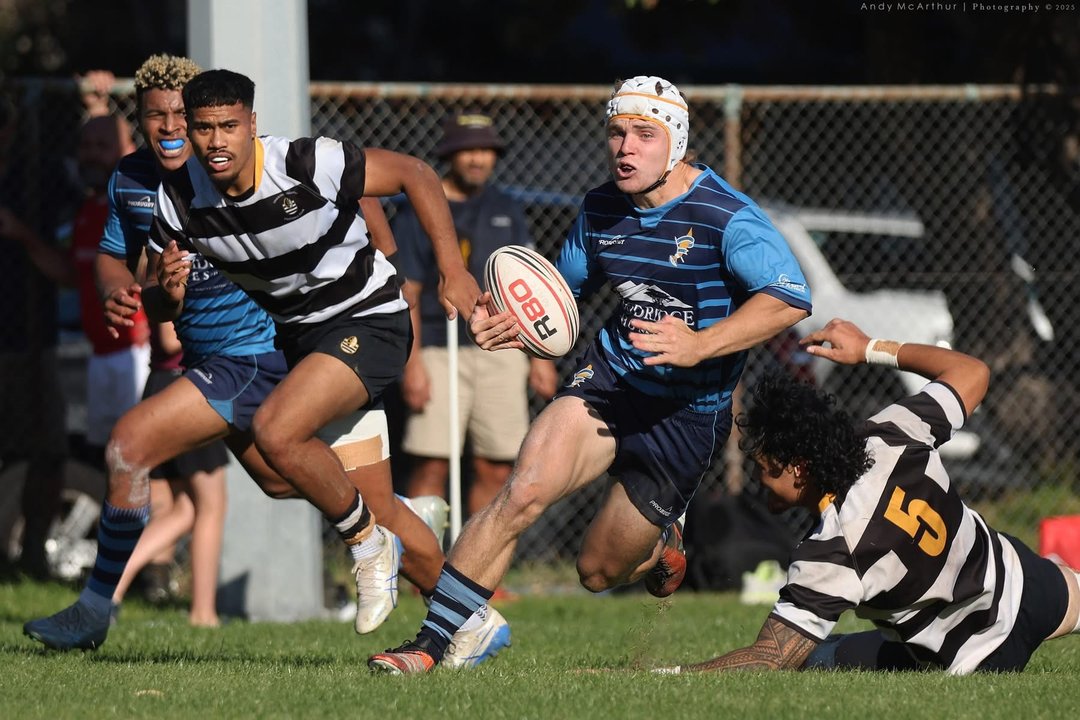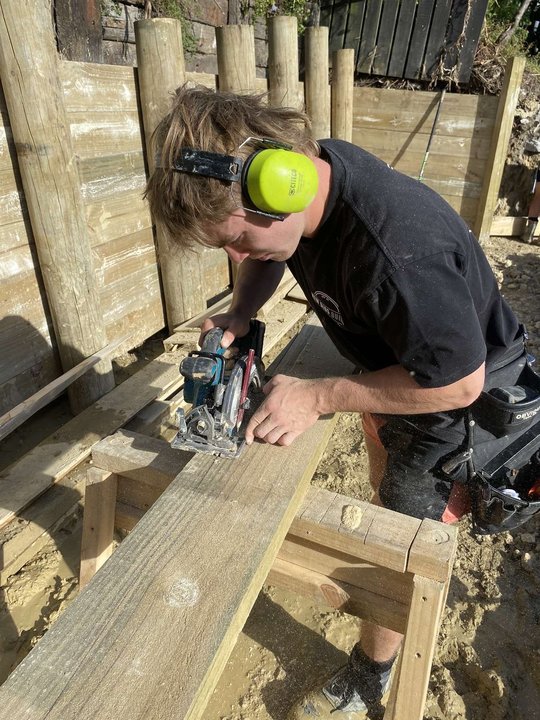
Jacob Kennedy
BCITO Sport Athlete
How do you juggle a sports career and a building apprenticeship? Any tips for balancing both?
The key for me when balancing both full time work and high performance rugby is communication. I will often sit down with my boss Digby Tattle and discuss my footy life and go over upcoming dates where I might require leave for rugby. I am extremely grateful for his understanding and leniency but it makes it easier for him when I am clear and open about what is going on. On the other side the Wellington rugby pathways manager Dion Waller does a good job in making sure us players know that a plan B is just as important as rugby. This is reinforced with the help of Ben Sigmund (the Wellington Rugby mental support person) who organizes frequent checkups with me to go over everything non-rugby related. He offers support around my apprenticeship, well-being, finances, and anything else that could bring on outside pressure.
So one tip to help make balancing a sports career and building apprenticeship is to communicate and be as open as possible with both work and rugby.
What made you want to dive into a building apprenticeship while still competing in your sport?
I've always been the hands on type of person and the idea of creating something for other people to enjoy sounded appealing.
Not only is it awesome being able to learn new skills that I know I'll use in the future but getting paid to do it is pretty cool as well. I had some basic knowledge to start with so I decided to jump straight into an apprenticeship out of school. So far there's been nothing I would've done differently. I also figured that doing a physical job would be beneficial to rugby as I'd build natural strength on site which would translate to strength in the gym for rugby.
Do the skills you’re learning in construction help you on the field? How do they connect?
There are many skills involved with construction that translate to rugby but some of the big ones that I've noticed are communication, problem solving and planning/ preparation. On the building site it is very important that comms are clear and loud as there is often a lot of background noise. If a message is misheard it could lead to an opening being out by 10mm meaning the window won’t fit. Similar to rugby, if the comms aren’t clear it could lead to players being in the wrong place which could end in a try to the other team.
When doing renovations we often come across things that aren’t expected or planned for and it’s up to us to find a solution and fix the problem. Rugby is full of unexpected circumstances so having that building mindset of being able to solve problems and think of solutions on the go is helpful.
Planning and preparation is fairly obvious but I didn't realize how much prep is actually required in construction. Whether it's keeping my tools clean so they last longer or preparing the site at the start of the day so it's easier to work on or even double checking the plans. This all connects back to rugby from keeping my boots and headgear clean to warming up my body so I move easier and even going over our team plays before training and games. I was quite surprised with how similar my mindset had to be in order to be efficient in both rugby and building.

Take us through a typical day for you! How do you balance training, competition, and your apprenticeship?
Depending on the job, I have to be on site at around 7am. Therefore most mornings I wake up at 6am and aim to be out of the house by 6:40am. Before I leave I'll have a big breakfast and a coffee to get the day started. Most days we’ll have two breaks for food and then finish up on site between 4pm and 5pm. From there I'll drive straight to training which starts at 6pm. If I get to training early i try to have another bite to eat and then do some personal work-ons out on the field. For the first training block of the night we do a gym session and for the second we’re out on the field for conditioning or skills. This usually finishes at around 8pm then I’ll have a cold plunge and shower to finish off. I’ll then drive home, have dinner and be in bed by 9.30pm.
What’s been the toughest part of balancing a building apprenticeship with a sports career?
The two biggest struggles for me when I first started were nutrition and lack of free time.
Doing five long and very physical days a week where I'm on my feet from sunrise to sunset isn't easy. So in order to stay energized I've realized how important nutrition is. For the first few weeks of working I struggled to get enough food in during the day as I only had the two breaks while at work. I was turning up to training feeling lethargic and wasn’t getting the gains I needed. I then started to pack more snack foods in my lunch so I was able to keep my food intake high by having a small bite to eat every hour or so. These snacks on top of my two big meals that I'd have during my breaks were enough to give me the energy to get through each day. This was and is sometimes still a struggle for me but because of my very high work rate throughout the week I've realised how important it is to just keep eating.
Another thing that has been quite tough while trying to balance an apprenticeship and a sports career is finding time for myself. In between building, rugby and getting my 8 hours of sleep, I have very little time each day to relax. The little time I do get, I try to spend with my family or catching up on study, whether that be for rugby or my apprenticeship. My Saturdays are devoted to rugby and on Sunday I’m usually too sore to do anything. Although it would be nice to have a bit more of a social life, these are the sacrifices I make in order to get better. I also have a really good relationship with the boys at work and people I train with so even though I don't go out much, I still get to laugh and banter with my mates.
Does construction give you a mental break from sports, or does it add to the pressure?
I enjoy building and find it somewhat satisfying when I can pick up the tools and create something visual as opposed to sitting in an office all day. It is a nice mental break from sports and although it can sometimes be stressful as well, I find it as a nice escape from rugby. I also love rugby, but when competing to get to the highest level, there is a lot of mental pressure and so it’s nice to have that balance of things to do outside of rugby.
Has your sports experience helped you succeed in your apprenticeship? How do teamwork and discipline play a role?
I believe that my time playing rugby has helped me immensely in my building apprenticeship. The discipline I've learned through rugby directly transfers to building. As I mentioned previously, things like turning up on time, keeping my gear tidy, working hard for someone else, etc. these are all skillsets I’ve learned from rugby and I believe are the building blocks to making a good tradie. Working well in a team is also something that every good rugby player must know how to do. This is the same on site. Not only is clear communication and problem solving in a team important but interacting with one another and keeping morale high is another key aspect to a good team environment, whether that be building or rugby.

How do you stay motivated and energized when juggling both a physically demanding sport and hands-on work?
For me, motivation comes from family and the outcome. My mum and dad and the rest of my family are very supportive and are the main reason I work hard to reach my goals. However, I see other young athletes and builders reach high levels and think there’s no reason why I can't do the same. It also comes back to that balance between rugby, work and my own time. As well as balancing life I try to make sure I'm constantly putting the right stuff in my body and getting enough sleep so that I can keep progressing.
What’s the long-term plan: Are you focusing on sports now, or do you see both careers coexisting in the future?
Linking back to my motivation for building, I believe I'll eventually have to come back to it, regardless of what happens with sport. Rugby can’t be played by an individual for as long as most sports due to its physical toll on the body. So my idea is that if I do play professional rugby full time, I'll eventually have to stop and fall back on a trade. Which is why my goal over the next couple of years is to complete my apprenticeship and become fully qualified. That’ll give me endless opportunities around the world to work after my rugby career. However, in the near future if rugby does get more serious, I'll have to stop building and put all my focus into the sport. This is the reason I'm working hard now to learn as much as I can and get as far through my apprenticeship as possible.
What advice would you give to young athletes who want to pursue something outside of sports while still competing?
To be honest, the only advice I’d give to young athletes competing in sport who wish to pursue something outside of sport is to find what works for you. If it takes a few months and a bit of trial and error to find a routine you enjoy then so be it. Everyone is different and not everyone's path to the top will be the same but if you can get yourself on a path you enjoy then you’ll find your journey a lot easier.
